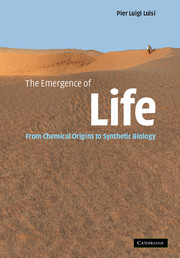Book contents
- Frontmatter
- Contents
- Preface
- Acknowledgments
- List of books on the origin of life
- 1 Conceptual framework of research on the origin of life on Earth
- 2 Approaches to the definitions of life
- 3 Selection in prebiotic chemistry: why this … and not that?
- 4 The bottle neck: macromolecular sequences
- 5 Self-organization
- 6 The notion of emergence
- 7 Self-replication and self-reproduction
- 8 Autopoiesis: the logic of cellular life
- 9 Compartments
- 10 Reactivity and transformation of vesicles
- 11 Approaches to the minimal cell
- Outlook
- References
- Index
Preface
Published online by Cambridge University Press: 17 December 2010
- Frontmatter
- Contents
- Preface
- Acknowledgments
- List of books on the origin of life
- 1 Conceptual framework of research on the origin of life on Earth
- 2 Approaches to the definitions of life
- 3 Selection in prebiotic chemistry: why this … and not that?
- 4 The bottle neck: macromolecular sequences
- 5 Self-organization
- 6 The notion of emergence
- 7 Self-replication and self-reproduction
- 8 Autopoiesis: the logic of cellular life
- 9 Compartments
- 10 Reactivity and transformation of vesicles
- 11 Approaches to the minimal cell
- Outlook
- References
- Index
Summary
There are already so many books on the origin of life, as listed on pages xiv–xi. Why then write another?
There are two answers to this question. The first comes from the desire to write a book for students – rather than a specialist book – in which the various phases of the transition to life would be laid out in a discursive way that illustrates the basic principles of self-organization, emergence, self-reproduction, autocatalysis, and their mutual interactions. Another important aspect of this teaching aim is to take into consideration the philosophical implications that are present, more or less consciously, in the field of the origin of life. I believe in fact that the younger generation of chemists and molecular biologists should be more cognizant of the connections between the biological and the philosophical quest, so as possibly to integrate the most basic language of epistemology, and see their science work in a broader dimension. This integration, when taken seriously, may also foster an interaction with the ethical and humanistic aspects of life. The age-old question: “what can science say about the domains of psyche, ethics, or consciousness?” is usually discarded by most scientists with a wave of the hand. This behavior is one of the main reasons why science has lost contact with the broad public – and again, it would be desirable that the younger generations take a different stand.
- Type
- Chapter
- Information
- The Emergence of LifeFrom Chemical Origins to Synthetic Biology, pp. xi - xiiPublisher: Cambridge University PressPrint publication year: 2006

